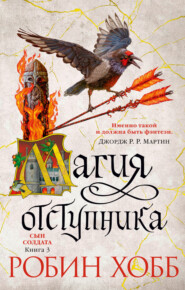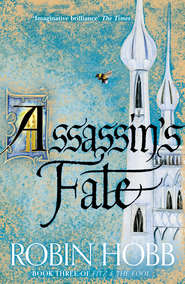По всем вопросам обращайтесь на: info@litportal.ru
(©) 2003-2024.
✖
The Mad Ship
Автор
Год написания книги
2019
Настройки чтения
Размер шрифта
Высота строк
Поля
Amber’s voice was small. ‘I had hoped you knew someone who would speak for you.’
Paragon was silent for a time. Then he laughed harshly. ‘No one will speak for me. This is a stupid effort, Amber. Think about it. Not even my own family cares for me. I know what they say about me. I am a killer. Moreover, it’s true, isn’t it? All hands lost. I rolled and drowned them all, and not just once. The Ludlucks are right, Amber. They should sell me to be chopped up.’ Despair washed over him, colder and deeper than any storm wave. ‘I’d like to be dead,’ he declared. ‘I’d just like to stop.’
‘You don’t mean that,’ Amber said softly. He could hear in her voice that she knew he did.
‘Would you do me a favour?’ he asked suddenly.
‘What?’
‘Kill me before they can.’
He heard the soft intake of her breath. ‘I…No. I couldn’t –’
‘If you knew they were coming to chop me up, you could. I will tell you the only sure way. You have to set fire to me. Not just in one place, but many, to make sure they cannot put it out and save me. If you gathered dry wood, a little each day, and put it in piles in my hold…’
‘Don’t even speak of such things,’ Amber said faintly. Distractedly, she added, ‘I should put the mussels on to cook now.’ He heard her scratching at her fire, then the sizzle of wet seaweed steaming on hot coals. She was cooking the mussels alive. He considered pointing that out to her. He decided it would only upset her, not sway her to his cause. He waited until she had come back to him. She sat on the sand, leaning against his canted hull. Her hair was very fine. When it brushed against his planking, it snagged and clung to the wood.
‘You don’t make sense,’ he pointed out genially. ‘You vow you would stand and fight for me, knowing you would lose. But this simple, sure mercy you refuse me.’
‘Death by flames is scarcely mercy.’
‘No. Being chopped to pieces is much more pleasant, I’m sure,’ Paragon retorted sarcastically.
‘You go so quickly from childish tantrums to cold logic,’ Amber said wonderingly. ‘Are you child or man? What are you?’
‘Both, perhaps. But you change the subject. Come. Promise me.’
‘No,’ she pleaded.
He let out his breath in a sigh. She would do it. He could hear it in her voice. If there were no other way to save him, then she would do it. A strange trembling ran through him. It was a strange victory to have won. ‘And jars of oil,’ he added. ‘When they come, you may not have much time. Oil would make the wood burn fast and hot.’
There followed a long silence. When she spoke again, her voice was altered. ‘They will try to move you in secret. Tell me how they would do it.’
‘Probably the same way I was put up here. They will wait for a high tide. Most likely, they would choose the highest tide of the month, at night. They will come with rollers, donkeys, men, and small boats. It will not be a small undertaking, but knowledgeable men could get it done quickly.’
Amber considered. ‘I shall have to move my things into you. I shall have to sleep aboard in order to guard you. Oh, Paragon,’ she cried out suddenly, ‘don’t you have anyone who could speak up for you to the Bingtown Council?’
‘Only you.’
‘I’ll try. But I doubt they will give me a chance. I’m an outsider in Bingtown. They only listen to their own.’
‘You once told me you were respected in Bingtown.’
‘As an artisan and a merchant, they respect me. I am not an Old Trader. They would not have much patience with me if I began meddling in their affairs. Likely, I would suddenly find I had no customers. Or perhaps worse. The whole town is becoming more divided along Old Trader and newcomer lines. There is a rumour that the Bingtown Council has sent a delegation to the Satrap, with their original charter. They will demand he honour the word of Satrap Esclepius. The rumour is that they will demand he recall all the New Traders, and cancel all the land grants he has made them. They also demand that Satrap Cosgo live up to the old charter, and forbear from issuing any more land grants without the consent of the Bingtown Traders.’
‘A detailed rumour,’ Paragon observed.
‘I have a keen ear for rumour and gossip. More than once, it has kept me alive.’
A silence fell.
‘I wish I knew when Althea was coming back.’ Amber’s voice was wistful. ‘I could ask her to speak for us.’
Paragon debated mentioning Brashen Trell. Brashen was his friend, Brashen would want to speak for him. Brashen was Old Trader. But even as he thought of that, he recalled that Brashen had been disinherited. Brashen was as much a disgrace to the Trell family as Paragon was to the Ludlucks. It would do no good to have Brashen speak out for him, even if he could get the Bingtown Traders’ Council to hear him. It would be one black sheep speaking on behalf of another. No one would listen. He set his hand over the scar on his chest, concealing for an instant the crude, seven-pointed star branded into him. His fingers travelled over it thoughtfully. He sighed, then drew a deep breath.
‘The mussels are done. I can smell them.’
‘Do you want to taste one?’
‘Why not?’ He should try new things while he still could. It might not be much longer before his chances to experience new things were gone forever.
2 THE PIRATE’S LEG (#ulink_bf303b9f-9103-57ec-8364-0b4a8087a7ce)
‘BACK IN THE monastery, Berandol used to say that one way to disperse fear and create decision was to consider the worst possible outcome of one’s actions.’ After a moment Wintrow added, ‘Berandol said that if one considered the worst possible outcome and planned how to face it, then he could be decisive when it came time to act.’
Vivacia glanced back over her shoulder at Wintrow. The boy had been leaning on the bow rail for the better part of the morning, staring out over the choppy water of the channel. The wind had pulled his black hair free of his queue. The ragged remnants of his brown garments looked more like a beggar’s rags than a priest’s robe. The sentient figurehead had been aware of him, but had chosen to share his silence and mood. There was little to say to each other that they did not both already know. Even now, the boy spoke only to put his own thoughts in order, not to ask any advice of her. She knew that, but still prompted him along. ‘And our worst fear is?’
Wintrow heaved a heavy sigh. ‘The pirate suffers from a fever that comes and goes. Each time it overpowers him, Kennit emerges from it weaker. The source is obviously the infection in his leg stump. Any animal bite is a dirty wound, but the sea serpent’s bite seems unusually poisoned. The festering part must be cut away, and the sooner the better. He is too weak for such a surgery, but I see little prospect that he will grow stronger. So I tell myself I must act swiftly. I also know it is unlikely he will survive my cutting. If he dies, so must my father and I. That was the bargain I struck with him.’ He paused, and then went on, ‘I would die. That is not truly the worst outcome. The worst is that you must continue alone, a slave of these pirates.’
He did not look at her but gazed out over the constantly moving waves as he added, ‘So you see why I have come to you. You have more right to a say in this than I do. I did not fully consider that when I struck my deal with Kennit. I wagered my death and my father’s. In doing so, I unintentionally wagered your life as well. It was not mine to bet. You have, I believe, a great deal more to lose than I.’
Vivacia nodded, but her own thought slid past Wintrow’s and into one of her own. ‘He is not what I expected a pirate to be. Captain Kennit, I mean.’ Thoughtfully she added, ‘A slave, you just said. But I do not think he considers me his slave.’
‘Kennit is not what I thought a pirate would be, either. But despite his charm and intelligence, we must remember that he is one. Moreover, we must recall that if I fail, he will not be the one to command you. He would be dead. There is no telling who would then possess you. It might be Sorcor, his first mate. It might be Etta, his woman. Or perhaps Sa’ Adar would once more attempt to claim you for himself and the freed slaves.’ Wintrow shook his head. ‘I cannot win. If the operation is successful, I must watch Kennit take you from me. Already he flatters and charms you with his words, and his crew works your decks. I have little say in anything that happens aboard you any more. Whether Kennit lives or dies, I will soon have no power to protect you.’
Vivacia shrugged one wizardwood shoulder. ‘And you did before?’ she asked, somewhat coldly.
‘I suppose not.’ The boy’s voice was apologetic. ‘Yet, I had some idea of what to expect. Too much has happened too fast, to both of us. There has been too much death, and too many changes. I have had no time to mourn, no time to meditate. I scarce know who or what I am any more.’
They both fell silent, considering.
Wintrow felt adrift in time. His life, his real life, was far away, in a peaceful monastery in a warm valley rich with orchards and fields. If he could step across the intervening days and distance, if he could wake up in his narrow bed in his cool cell, he was sure he could pick up the threads of that life. He hadn’t changed, he insisted to himself. Not really. So he was missing a finger. He had learned to cope with that. And the slave tattoo on his face went no deeper than his skin. He had never truly been a slave; the tattoo had only been his father’s cruel revenge for his attempt at escaping. He was still Wintrow. In a few quiet days, he could rediscover the peaceful priest inside him.
But not here. The recent swiftly shifting events in his life had left him with so many strong emotions, he could scarcely feel at all. Vivacia’s feelings were as jumbled as his own, for her recent experiences had been as brutal. Kyle Haven had forced the young liveship into service as a slaver, prey to all the dark emotions of her miserable cargo. Wintrow, a blood member of her founding family, had not been able to comfort her. His own involuntary servitude on the ship had soured what should have been a natural bond between them. His alienation from her had only increased Vivacia’s misery. Yet still they had hobbled along, like slaves shackled together.
In one stormy, bloody night, the slaves’ uprising had freed her of Kyle Haven’s captaincy and her role as a slaver. Of the original crew, Wintrow and his father were the sole survivors. As dawn lightened the sky, the crippled ship was overtaken by pirates. Captain Kennit and his crew had claimed Vivacia as a prize without striking a single blow. Then it was that Wintrow had struck his bargain with Kennit: he would try to save the pirate’s life if Kennit would allow him and his father to live. Sa’Adar, a priest among the slaves and the leader of the uprising, had other ambitions. He wished not only to stand in judgment on Wintrow’s father Kyle, but also to demand Kennit turn the Vivacia over to the slaves as their rightful prize. No matter who prevailed, the future was uncertain for both Wintrow and the ship. Yet, the ship already seemed to favour the pirate.
Ahead of them, the Marietta cut a brisk path through the lace-edged waves. Vivacia followed eagerly in her wake. They were bound for some pirate stronghold; Wintrow knew no more than that. To the west, the horizon disappeared into the foggy coast of the Cursed Shores. The swift-running steaming rivers of that region dumped their warm and silty waters into this channel, which created near permanent mists and fogs that cloaked an ever-changing shoreline of shoals and shallows. Sudden, violent storms were common in the winter months, and not unknown even in the kinder days of summer. The pirate islands were uncharted. What sense was there in charting a coast that changed almost daily? The conventional wisdom was to give it a wide berth and sail swiftly past it. Yet the Marietta surged forward confidently and Vivacia followed. Obviously, the pirates were very familiar with these channels and islands.
Wintrow turned his head and looked back over the Vivacia. In the rigging above, the pirate crew moved briskly and competently to Brig’s bellowed commands. Wintrow had to admit he had never seen the Vivacia sailed with such skill. Pirates they might be, but they were also excellent sailors, moving with discipline and coordination, as smoothly as if they were living parts of the quickened ship.
But there were others on deck to spoil the image. Most of the slaves had survived the rebellion. Freed of their chains, they were still recovering the aspects of full humanity. The marks of manacles were yet on their flesh and the slave tattoos on their faces. Their clothes were ragged, and the bodies that showed through the rents were pale and bony. There were far too many of them for Vivacia’s size. Although they now occupied the open decks as well as the holds below, they still had the crowded look of cattle being transported. They stood idly in small groups on the busy decks, moving only when the crew gestured them out of the way. Some of the healthier ones worked dispiritedly with rags and buckets, cleaning Vivacia’s decks and holds. Dissatisfaction showed on many faces. Wintrow wondered uneasily if they would act on it.
He wondered what he felt about them. Before their uprising, Wintrow had tended them belowdecks. His heart had rung with pity for them then. True, he had had small comfort to offer them: the dubious relief of saltwater and a washing rag seemed a false mercy now. He had tried to do a priest’s duties for them, but there had simply been too many. Now whenever he looked at them, instead of recalling his compassion for them, he remembered the screams and the blood as they had killed all his shipmates. He could not name the emotion that now swept through him when he considered the former slaves. Compounded of fear and anger, disgust and sympathy, it wrenched his soul with shame at feeling it. It was not a worthy emotion for a priest of Sa to experience. So he chose his other option. He felt nothing.
Some of the sailors, perhaps, had deserved their violent deaths, as men judged such things. But what of Mild, who had befriended Wintrow, and the fiddler Findow and fun-loving Comfrey and the other good men? Surely, they had merited a kinder end. The Vivacia had not been a slaver when they signed aboard. They had remained aboard her when Kyle had decided to put her to that use. Sa’Adar, the slave priest freed in the rebellion, believed that all who had died had deserved it. He preached that by working as crew on a slave ship, they had become the enemies of all just men. Wintrow felt himself deeply divided on that. He clung to the comforting idea that Sa did not demand he judge others. He told himself that Sa reserved all judging for himself, for only the creator had the wisdom to be judge.
The slaves on board did not share Wintrow’s opinion. Some looked at him and seemed to recall a soft-spoken voice in the darkness and hands with a cool damp rag. Others saw him as a sham, as the captain’s son playing at mercy but doing little to free them until they had taken matters into their own hands. One and all, they avoided him. He could not fault them. He avoided them as well, choosing to spend most of his time on the foredeck near Vivacia. The pirate crewmembers only came there when the operation of the ship demanded it. Otherwise, they avoided it as superstitiously as the slaves did. The living, speaking figurehead frightened them. If their shunning of her bothered Vivacia, she gave no sign of it. For Wintrow’s part, he was glad there was still one place aboard ship where he could be relatively alone. He leaned his head back against her railing and tried to find a thought that wasn’t painful.

















